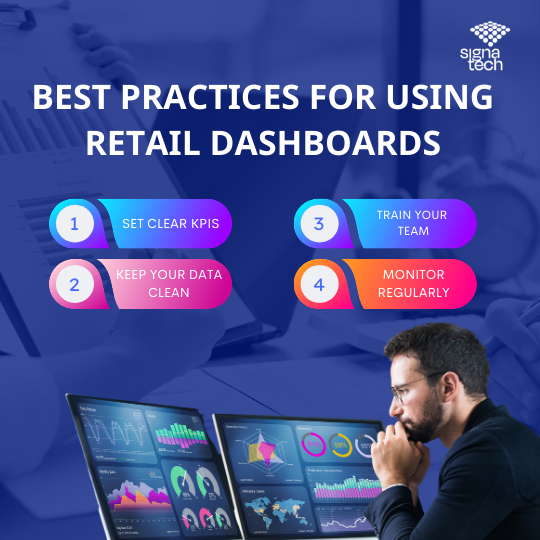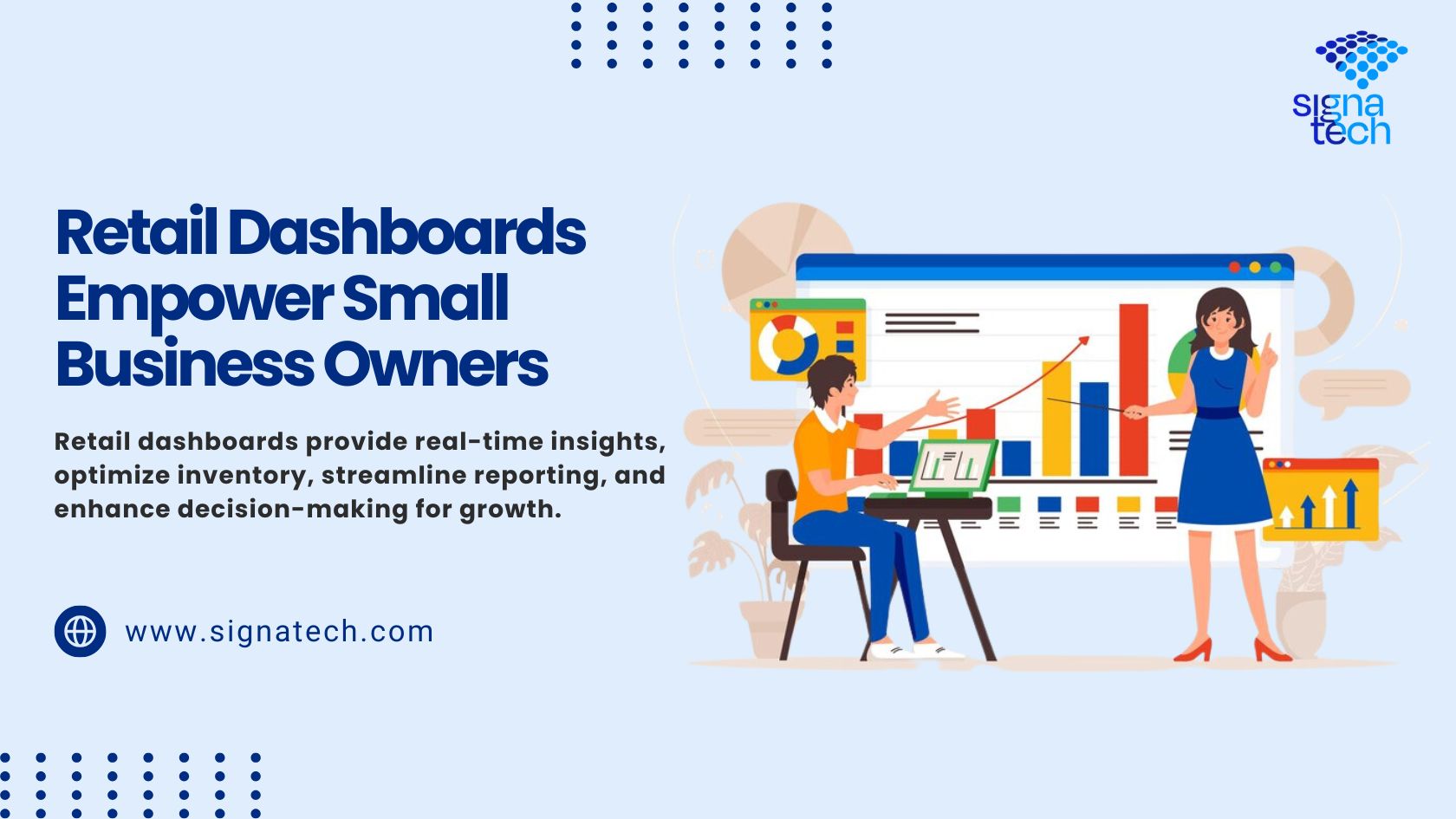It is equally important for any small business owner to understand that there are also its fair share of problems that it has to face. Between ordering stock, analyzing sales, and keeping a check on the latest trends that can affect the business, owners of small businesses are often overwhelmed. The solution to these tasks is all about the use of technology such as the Retail Dashboard for small business. These are powerful tools that give an overview of your business processes, which help make the right decisions with minimal effort.
Here you will learn how retail dashboards help small business owners, what advantages it has, and how to choose and implement a retail dashboard for your business.
Understanding Retail Dashboard for small business
Retail dashboard is not just an application but it is a friend for the business owner. It centralizes your business data and provides it in a more understandable form. It is like a dashboard of your business where you get everything you want to know about your sales, your inventory, and your customers.
Types of Retail Dashboards
- Sales Dashboards: Display revenue by month, top products, and key performance indicators.
- Inventory Dashboards: Monitor the stock, track slow movers and anticipate the time when they will run out.
- Customer Dashboards: Offer information on customers’ activity, their buying frequency and average consumption.
These features help the owners of small businesses to remain as active as possible and not reactive.
Key Benefits of Retail Dashboards
1. Improved Decision-Making
Decision making is always a challenge when one is not sure of the information to use. Retail Dashboard for small business presents complex information in a simple format, helping you:
- Spot trends quickly.
- Change the price structure or offer some special selling offers.
- Find out opportunities, for instance, products that are in high demand.
Every decision you make is informed, and the guess or speculation you might engage in is reduced to the barest minimum.
2. Efficient Inventory Management
Inventory management is one of the biggest challenges that most small business establishments face. If a company stocks up too many products, it wastes resources, and if it stocks up too few, it loses potential sales. Dashboards solve these problems by:
- Emphasizing on which products are moving most in the market.
- Reminding you when the stock is low.
- Forecasting the demand by relying on the past data.
For instance, in your inventory dashboard, if you realize that a particular product has received many orders, you can order more in advance of being sold out.
3. Enhanced Sales Monitoring
Manual tracking of sales is cumbersome and also can lead to errors being made. Retail Dashboard for small business simplifies this process by providing:
- Information on sales made in real-time.
- Based on products, stores, or salespeople, for example.
- Awareness of cyclical demand patterns, allowing you to be ready for the time of the year that will be most popular.
This transparency helps you to know what is good and what needs to be changed.
4. Increased Cost Savings
Retail dashboards can save a significant amount of time and, therefore, money. When you automate the data collection and analysis, then you will not need to rely so much on reporting. Also, dashboards can identify such expenditures, and thus, it is possible to reduce such expenses and invest the money into the business’s development.
5. Better Customer Insights
Knowing your customers is key to keeping up with the competition. Dashboards provide valuable data on:
- Customer tastes and habits with regard to consumption and procurement.
- Average order values.
- Customer retention rates.
By using this information, you can create offers that are more likely to be desired by customers and can create loyalty programs.
6. Scalability for Growth
The data requirements of your business also increase as your business expands. Retail Dashboard for small business is highly extensible, which means that they can work with larger volumes of data as the business grows. For this reason, they are a perfect fit for the small business that is looking to the future and preparing for growth.
How to Choose the Right Retail Dashboard
It is important therefore to understand that not all retail dashboards are the same. Choosing the right one depends on the needs of your business and should therefore be carefully chosen.
1. Identify Your Goals
One of the first things you need to consider when creating a dashboard is what you want to accomplish with it. Do you want to improve the tracking of sales? Manage inventory? Understand customer behavior? This should give you a better idea on what you want and thus it will help you to reduce your options.
2. Prioritize Ease of Use
A dashboard is only of value if it is easy to use. Retail Dashboard for small business should have friendly interfaces and be easy to navigate. A tool that can be easily trained means that your team can begin to use it as soon as possible.
3. Ensure Compatibility
Your dashboard should be able to fit right into your current set of tools. In every aspect of your business, whether it is your Point of Sale system, your e-commerce solution or your accounting software, compatibility is the name of the game.
4. Consider Scalability
With the growth of your business, you should expect your dashboard also to expand. Select a tool which can accommodate more data and can become more complex with time.
5. Budget Wisely
Retail Dashboard for small business is a worthy investment, but it is crucial to identify a solution that will fit your pocket. Most of the providers have flexible pricing models, or free initial accounts to help you begin with.
Best Practices for Using Retail Dashboards

To fully harness the power of retail dashboards, follow these best practices:
1. Set Clear KPIs
Determine what KPIs you wish to monitor, including sales increase, customer conversion rate, or the average number of orders per customer. This means that your goals are clear and your dashboard is aligned to what is most important.
2. Keep Your Data Clean
The fact is that accurate data produces accurate insights. It is recommended that data must be updated at times and reviewed to see if it contains any wrong data.
3. Train Your Team
Spend time in training your employees on how to use the dashboard so that it can be of much help to you. The better they know the tool, the more effectively they will be able to utilize the features of the tool.
4. Monitor Regularly
It is recommended to spend at least one week or one month to go through your dashboard. This is the right time to review various aspects and consider the effectiveness of planned and implemented measures.
Challenges Small Businesses May Face with Retail Dashboards
While retail dashboards offer numerous benefits, small business owners may encounter a few challenges:
1. Initial Costs
Although initial costs of a retail dashboard may be slightly expensive, the benefits are often worth the costs in the long run. It is advisable to begin with a basic strategy and then expand as the business grows.
2. Learning Curve
To embrace new technology can be quite challenging in the beginning. Choose a Retail Dashboard for small business with strong customer support and training services to help you transition easily.
3. Data Overload
Overwhelming might be the first emotion one has when trying to make sense of too much data. Do not get stuck in the analysis phase by trying to track every possible metric related to your business objectives.
Design Tips for Effective Dashboards
To ensure your dashboard is as useful as it is visually appealing:
- Stay clear and clean with the typography.
- Use black and white to focus on the numbers, but use different shades of the two colors to focus on specific figures.
- This is important in order to reduce lags in the application.
- This means that the layout of the site should also be simple and easy to navigate by everyone.
Conclusion
Retail dashboards are a blessing for small business owners as they provide an opportunity to manage all processes at once and make wise decisions. It can be used to increase inventory accuracy and customer knowledge, and that is just the tip of the iceberg. For deeper insights and maximizing the potential of these tools, consider leveraging Business Intelligence Consulting Services to optimize your dashboard’s capabilities.
At Signstech, our mission is to support the small business sector by providing the best technologies for them to thrive. Are you ready to transform your business? Contact us today to find out how you could benefit from our retail dashboards and be ready for the best.
H owabout making your data useful for you?
